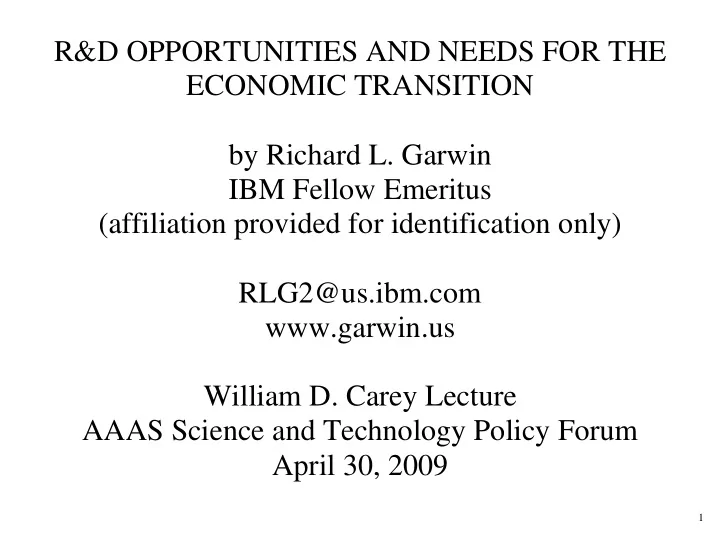

R&D OPPORTUNITIES AND NEEDS FOR THE ECONOMIC TRANSITION by Richard L. Garwin IBM Fellow Emeritus (affiliation provided for identification only) RLG2@us.ibm.com www.garwin.us William D. Carey Lecture AAAS Science and Technology Policy Forum April 30, 2009 1
OUTLINE Where we’ve been. The fiscal meltdown Impact on the real economy The Obama revolution o R&D can provide: A new way of doing A new something to do A cheaper way A way not to do The hazard of responsible review Internal competition is helpful Innovation An alternative to patents 2
Outline (2) Some lessons from the Fast Fourier Transform The “site:” particle Nuclear power and the energy problem Uranium from seawater Details of transmission of disease—e.g. influenza Simulation and modeling o Influenza o For public policy o Of the U.S. STEM educational process o Validate the model and look at the assumptions Conclusion 3
4
5
6
7
8
“It's probably not going to be practical to contain a potential pandemic by merely trying to limit contact between people (such as by travel restrictions, quarantine or even closing schools), but we find that these measures are useful in buying time to produce and distribute sufficient quantities of vaccine and antiviral drugs,” said Germann of Los Alamos’ Applied Physics Division. “Based on our results, combinations of mitigation strategies such as stockpiling vaccines or antiviral agents, along with social distancing measures could be particularly effective in slowing pandemic flu spread in the U.S.,” added Longini. (Timothy C. Germann, Kai Kadau, Ira M. Longini, Jr., and Catherine A. Macken, Mitigation strategies for pandemic influenza in the United States, PNAS 2006 103:5935-5940; published online before print April 3, 2006) 9
10
11
12
13
14
15
Recommend
More recommend